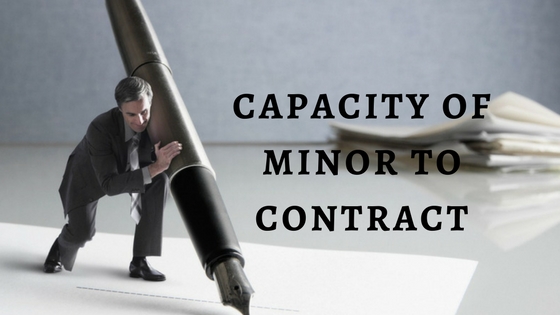Liability of a Minor in the Breach of Contract.
By Adebayo Faruq
I was passing by on a very busy street on a very fateful day. If not late January of 2020, it would be early February of 2020. I can still remember the street was so disgusting that the buildings were powdery with dust.
Succinctly, It was during Harmattan season. By my left side was a complex of different shops with different stocks of goods. At the fore of a shop in the complex was a woman scolding a young girl of 18 years angrily and painstakingly. My attention was caught, that was when I remembered that one of my neighbours was also a seller beside the woman’s shop. I said to myself”it is humble to greet elder people, let me greet my neighbour”. I sat down with a wide smile on my mouth and excessive greetings. I later faced my mission to know the root for chastening the little girl so hard. I later discovered that she bought rice and beans, she went to the next shop, she bought 3 latest head gears, 2 latest black gown and 2 high heels to supplement the one she had at home. All were bought on credit till when her father returned from his journey as she promised the sellers. Her father returned and insisted not to pay on the basis that Bukola was a minor. Is this true in the eyes of law or not?
The issue of minority has been determined in the case of LABINJOH V ABAKE[1924]5 NLR 33 , the court rejected the argument of counsel that the age of majority in Nigeria is liberty and held that the age of majority in Nigeria is 21.
The contracts by Bukola are therefore subject to special rule of a contract of an infant.
Taking a look at the kinds of goods bought by her, they are of two goods which are necessary and non-necessary goods.
Necessary goods are suitable to the condition of life of an infant and individual cannot exist without it during the period of sale and delivery. Therefore, food can be necessary to a poor infant and non-necessary to rich infant. It is vary. In the case of NASH V INMAN [1908]2 K.B.1 the defendant, an infant was sued for the cost of sewing 11 fancy coats. It was proved that the defendant had an adequate supply of coats suitable for his condition in life. It was held that the clothes were not necessaries.
If the goods bought by the infant are necessary goods, the contract is binding and the infant must pay reasonable amount, Pursuant to Section 2 of SALE OF GOODS ACT. However, if otherwise the contract is not enforceable as it is void.
In determining the liability of Bukola, it is imperative to consider the status of Bukola during the transaction. Rice and beans can be categorized as necessary goods as she has to eat to sustain her life. Also note that her father was not around which might have caused insufficiency for her. She would be laible for the procurement of rice and beans, thereby paying a reasonable amount for it. The other goods are not necessary (latest head gears, latest black gowns and high heels), they are not enforceable. Therefore, she is not liable for it. She can do without the goods, they are not the items to sustain her life as it was held in the case of NASH V INMAN.
****************************************************************************************
This work is published under the free legal awareness project of Sabi Law Foundation (www.SabiLaw.org) funded by the law firm of Bezaleel Chambers International (www.BezaleelChambers.com). The writer was not paid or charged any publishing fee. You too can support the legal awareness projects and programs of Sabi Law Foundation by donating to us. Donate here and get our unique appreciation certificate or memento.
DISCLAIMER:
This publication is not a piece of legal advice. The opinion expressed in this publication is that of the author(s) and not necessarily the opinion of our organisation, staff and partners.
PROJECTS:
🛒 Take short courses, get samples/precedents and learn your rights at www.SabiLaw.org
🎯 Publish your legal articles for FREE by sending to: eve@sabilaw.org
🎁 Receive our free Daily Law Tips & other publications via our website and social media accounts or join our free whatsapp group: Daily Law Tips Group 5
KEEP IN TOUCH:
Get updates on all the free legal awareness projects of Sabi Law (#SabiLaw) and its partners, via:
YouTube: SabiLaw
Twitter: @Sabi_Law
Facebook page: SabiLaw
Instagram: @SabiLaw.org_
WhatsApp Group: Free Daily Law Tips Group 5
Telegram Group: Free Daily Law Tips Group
Facebook group: SabiLaw
Email: lisa@sabilaw.org
Website: www.SabiLaw.org
ABOUT US & OUR PARTNERS:
This publication is the initiative of the Sabi Law Foundation (www.SabiLaw.org) funded by the law firm of Bezaleel Chambers International (www.BezaleelChambers.com). Sabi Law Foundation is a Not-For-Profit and Non-Governmental Legal Awareness Organization based in Nigeria. It is the first of its kind and has been promoting free legal awareness since 2010.
DONATION & SPONSORSHIP:
As a registered not-for-profit and non-governmental organisation, Sabi Law Foundation relies on donations and sponsorships to promote free legal awareness across Nigeria and the world. With a vast followership across the globe, your donations will assist us to increase legal awareness, improve access to justice, reduce common legal disputes and crimes in Nigeria. Make your donations to us here or contact us for sponsorship and partnership, via: lisa@SabiLaw.org or +234 903 913 1200.
***********************************************************************************




















































